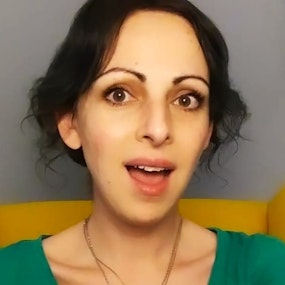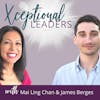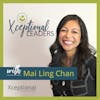DEI in Film Production & Scaling Your Business with Koura Linda

Mai Ling starts off this solo-hosted episode with an update about our new episode collections that make it easy to do a deep dive into a specific topic. Then she brings founder and CEO of Space Dream Productions, Koura Linda, onto the show to talk...
Mai Ling starts off this solo-hosted episode with an update about our new episode collections that make it easy to do a deep dive into a specific topic. Then she brings founder and CEO of Space Dream Productions, Koura Linda, onto the show to talk about diversity, equity, and inclusion in film production and how her company is working in that arena. Koura talks about being a facilitator of communication and how her job is “to assist other artists, activists, and educators with connecting with audiences and communicating with them.” And she also dives into some important things to consider when scaling your business, regardless of the industry.
Contact Mai Ling: MLC at mailingchan.com
Contact James: James at slptransitions.com
Koura Linda 0:01
We kind of came up with the idea of being a facilitator of communication that our job is to assist other artists, activists and educators with connecting with audiences and communicating with them.
Mai Ling Chan 0:18
You're listening to the exceptional leaders podcast each week, we give you a front row seat to our conversations with new and successful entrepreneurs and thought leaders making an impact in the special education and disability communities. They share their intimate experiences so you can start grow and expand your impact. I'm mailing you can find me at mai Ling chan.com. And James Burgess won't be joining me today because he's away at a conference at the time of recording this intro. But don't worry, he'll be back for the next show. This week, I interviewed Cora Linda, a producer, who's leading the industry with an inclusive lens in all of her projects. This actually brought me to think about all of the episodes that we have already been sharing out there. And we are up to 138 episodes, this is number 138. And when I went back to see what other episodes pertained to the entertainment industry, I was really surprised to find that we had a wonderful collection. And so I put together the exceptional collection series. So we're going to be doing a number of blog posts on posting them on LinkedIn, where you can find groupings of our shows together. So a number of people have asked me, oh, how many of your shows are specifically on business and entrepreneurship, and I couldn't tell them. So I said, You know what, I really need to go back in deep dive into each show and make sure that I have the correct tags. Now, if you were doing any type of website or blog posts, you know that the tags are really important, that has kind of been an afterthought for us. And we have kind of been depending on our marketing team to do that. And I've taken it back over. And we are going to be deep diving and making sure that every episode has the correct tags so that you can quickly find them when you come to the exception or leaders podcast website. So if you're interested in this new article, I will read a little bit of the intro to you. It's a post on LinkedIn. And you can find it either on the exceptional leaders podcast page, or under my personal posts. And it's called Transforming disability representation in entertainment one story at a time. Now I have to say, I am a little worried that we will have some drop off where people read the article. And then they don't actually listen to the podcast, because maybe they don't like listening to audio, or they just don't have the time. So I'm really hoping that this will help to move some of our audience or potential audience over to listening like you do. So if you could help us that would be great. I know that you are a listener. And I know you love listening to us because I've heard some great feedback out there. And obviously, we are really hitting bigger downloads now than we did in the past years. So if you could share these episodes, meaning if you hear of a guest that you love, or really has touched you, their story has really impacted you. Or you feel that someone that you work with maybe a colleague, a parent, someone else in our disability community could really benefit from what we're hearing, that would be fantastic and so helpful for us. So here's the quick intro in that article. It says it is rare to find individuals completely detached from the vibrant and ever evolving realm of media and entertainment. Therefore, it is essential that we create a world where entertainment is as diverse as the society we live in. We are excited to present a unique opportunity to connect with profound and impactful stories and experiences of individuals with disabilities in the entertainment industry, ranging from movies and TV to the arts and acting. This collection of insightful narratives brings to light the compelling need for a more inclusive world of entertainment. Join us as we delve into the insights of industry trailblazers, featured in the captivating podcast episodes of exceptional leaders. Each story underlines the undeniable urgency for equitable representation in all areas of entertainment. Together we can redefine the narrative and truly celebrate all human stories. We recommend you begin your journey with co host mailing Chan's interview with Eileen Gruber, a fearless trailblazer and a beacon of inspiration who sees lessly advocates for inclusion with every role she embodies in every stage she graces Eileen champions the cause of disability representation, uncover the power of diversity through her compelling narrative and become part of the revolutionary shift towards inclusivity in the world of entertainment, and then the rest of the post includes a few of our episodes and links where you can directly go and listen. So I am really excited. If you get the chance to see this post on LinkedIn, please give us feedback, let us know what you like about it, what we can do better. We're going to continue putting these collections together for you, and focusing in on our topics like entrepreneurship, business, nonprofit, fashion, and all of the great things that you've heard here. So before we get to this fantastic interview with Cora, Linda, I just want to invite you to continue to connect with us, we love getting your emails, and your messages telling us how to make the show better and what you love about it. I do want to read this one, this special one from Christine Torrio. We connected on LinkedIn actually. And she says the exceptional leaders podcast is such an informative and enjoyable podcast, I learned something new with each episode. I especially like how the interviews includes disabled voices, and not just people who work with disabled individuals. I'm a new listener, but of binge at least five episodes this week alone can't wait to continue learning. Thank you so much, Christine, we love to be able to talk directly to you. So for our listener, please go out there, give us a new fresh review out on any of those podcast platforms that you listen to, we have a few from a couple years ago. And because we're really trying to get the information out there and get out to new audience, it would be really great if you could just take a moment to pop a quick review and just give us five stars and say, hey, the show is really valuable and helpful. So with that, let's get to the conversation with Cora, Linda. I'm here today with the founder of space Dream Productions, Cora, Linda. And she has an independent film and music production company that focuses on being facilitators of communication, which is perfect for me. And what's important is that they don't have any control through commercial work. They work directly with artists, activists, and educators. And I'm really excited to delve into this music and entertainment industry with you, Cora, so thanks for joining us. Thanks for having me. Wonderful. So if you could start out kind of sharing with us what makes your production company different than the other ones that are out there.
Koura Linda 7:12
So there's a lot of independent filmmakers that create companies to have a separate entity from them, so that when they do freelance work, you know, they have a DBA doing business as or maybe an LLC that they're the sole proprietor of, and so they have a company that's just an entity, differentiation for tax purposes or whatever. There are some indie filmmakers who have like a company and they, you know, make shoot commercials or car commercials and commercials are made. And that's great. But to the best of my knowledge, there are not a lot of independent film production companies out there that sustain solely on storytelling on whether it's educating people through some sort of, you know, a YouTube or a podcast or whatever, or even just you're making tic TOCs, or social media content, documentary films, narrative films, whatever the storytelling vessel is. Most production companies lean heavily on consumerism and commercialism to sustain. And they don't focus on that storytelling part. We do, we sort of when we were figuring out our branding, we kind of came up with the idea of being a facilitator of communication, that our job is to assist other artists, activists and educators with connecting with audiences and communicating with them, sharing their story, educating them raising awareness, whatever that message is, whether it's through a tick tock video, a YouTube video, a podcast, a poster, or whatever it is that we're doing to connect the audience to the Creator, to the creative, I should say, that site kind of our space, and that is very uncommon. As like a day job quote, unquote, like we don't do marketing. I don't provide marketing services. If I create Tik Tok content for someone, we're not going to manage their Tik Tok account, we're just gonna give them the videos. We're not a branding agency or an advertising agency. We are purely creative.
Mai Ling Chan 9:21
That's so fascinating, just because I personally don't have any experience with it. But what I am thinking is that a lot of businesses and brands need to be thinking about this lens, and also wondering where you are in the space of disability and accessibility and representation in your work.
Koura Linda 9:38
Absolutely. So I live with several disabilities myself, I had to kind of redefine my life and figure out what I was going to do when I ended up as a wheelchair user for a period of time in 2011. And part of running and maintaining space during production. This has been to create a space where, honestly, I fit our company is completely accessible. Because I have the autonomy to make it accessible, I don't have to answer to a board of directors or two partners or two people who are going to miss prioritize things in a way that decreases or diminishes accessibility. So as the head of the company, I have the autonomy to make that space. And then I'm able to hire people with disabilities, because we do have that understanding. And we do provide that accessibility. And it enables us to collaborate with filmmakers with disabilities with business owners with disabilities, because we understand and it's not even, it's, it's just part of our day to day, it's not even like an accommodation, quote, unquote, it's just operating. Like, it's just what we do.
Mai Ling Chan 10:52
I love this. I love this. I'm like, one of those things, I'm just trying to jump in. But everything you're saying. So important, though, for our listener, and I'm sure that you're experiencing this also, representation is essential nowadays. And I don't know, if you've experienced this, but people are always saying, Well, you know, it's so hard to find the talent that we're looking for, oh, it's so hard to find, you know, being able to fulfill these need to say, and it's like checkboxes requirements, you know, being able to represent all of the different areas of diversity inclusion. And I've seen this so many times, for example, on a conference, everyone is a certain type, you know, a certain culture or certain ethnicity. And you've seen that in tech too, like, I know, I will see everyone's Asian, I know, it's kind of funny, right. And so where you are, is just cutting edge. And I love hearing this is that you're having so many people on your team, who are representing a person with a disability or, you know, just really needs accommodations, and you're able to just fluidly provide that. Tell me more about this, because I think everyone is trying to achieve this type of team.
Koura Linda 11:57
So I will say that this is going to sound so cold and harsh. But to me, if you don't like humanity is diverse, it just is, if you don't have a very diverse team, or a very diverse network, that almost takes effort, in my opinion, to like, let yourself off from that. We just hired our summer interns. And we ended up hiring people of several different races and nationalities and ethnicities and abilities and genders. And we didn't try, we just put out the application had people fill out the application went off the application responses, we didn't even look at their names until we looked at their responses, cut some off of the application just because we knew it wasn't going to work just from their responses. started the interview process. We had no idea what these people looked like we had no idea unless they volunteered information about themselves. We had knew nothing about them. And at the end of the process, I looked back and I was like, Oh, this is cool. We have this person and that person. Like we weren't used to do that yet. It's just we organically reached out. And I can't tell you how many times I've been on a phone set where I'm looking around and I'm like, Oh ha we have LGBTQIA people here we have people with disabilities here. We have men here we have women here. We have like all these different people, just because that's what our network is like, we just work with humans.
Mai Ling Chan 13:33
Oh my gosh, what a slogan, we are humans.
Koura Linda 13:37
have to write that down? Yeah, I feel like going back to what you said about the disability inclusion and like finding those people. I want to say that's the most like frustrating thing in the universe to hear. There's an organization currently called forward doc. It's filmmakers with disabilities, documentary filmmakers, they have opened their umbrella to include people like me that are not documentary filmmakers, but that are people with disabilities who work in narrative spaces or other storytellers. Forward dock. As a group. I think there's like almost 1000 People just in the Facebook group alone. And they range from teenagers who got their parents permissions who want to make movies and join the group to literally Oscar nominated filmmakers, like Emmy winners, like these people are so talented and so available. So whenever I hear oh, we can't find them. I'm like, but are you looking? Because step one is just connect. If you're looking specifically for people with disabilities, go to foward doc, they have a vast network and can provide you all all the disabled people to work with you that are proven competent, trained, skilled, hardworking, passionate. Yeah.
Mai Ling Chan 14:56
Excellent. Thank you. Thank you. Okay. So When did you create your company? When did you start?
Koura Linda 15:03
So I started my company as a DBA. In 2013, I think the paperwork might have gone through in like January 2014. But first time I said the word space Dream Productions was, I think December 2013.
Mai Ling Chan 15:15
Nice. And now we're nine years later. And I know that you are in the space of getting ready to scale. So tell me what that looks like.
Koura Linda 15:21
So as a business owner, scaling is hard. It is one of these, you kind of have to have things before you're able to do anything, which is very frustrating. Because if you can't like unless you go the venture capitalist route, or the angel investor route, and you're basically giving up ownership of your company, in exchange for the funds, every time you want to expand, I mean, I'm sure anybody listening who is an entrepreneur is aware of just base overhead costs, you know, having a website, you can make a free landing page. But that only works for so long. Eventually, you do need a paid website. If you have an email list, you know, there are free options. But then eventually, if you have a certain size of your mailing list, you need to pay for that service. If you want to use a company based email, you have to pay for those. If you register as an LLC, or now you know, you need to really structure your business, you need to pay for taxes, you need to do accounting, you need to if you have staff, you have to do payroll. And payroll isn't just what you pay the person you have to do payroll taxes, and unemployment taxes and workers comp. And wherever your employee is based, you have to follow the employment laws, which means working with an employment attorney to make sure that you're not violating anything. If you work with contractors, you need contractor reviews, you need to make sure that those are all legal, you need to make sure that like, anyway, there's a lot that goes into running a business. And every time you want to grow every time you want to add someone to your team. There's the onboarding cost, there's the hiring cost, there's the training time and the apprenticeship time. We do a lot of internships because it helps us cut back on that sort of onboarding and apprenticeship time. And it enables us to help fill the industry with more experienced filmmakers with filmmakers who actually have hands on training beyond just their film school. We've worked with a lot of colleges and had a lot of interns come through. But once you reach that point of the next level, and we don't even have like Cost of Goods Sold expenses. At this point, we just have administrative costs and operating costs, and it adds up really quickly.
Mai Ling Chan 17:44
If you're like me, you can't get enough of books, podcasts, blogs, and other ways to find out how to create grow and scale. That's why I brought together 43 disability focused leaders to give you more of what you're looking for. You will hear their stories and three best selling books, which focus on general offerings, augmentative, and alternative communication, and speech language pathology. I invite you to search for becoming an exceptional leader on Amazon. So you can learn intimate startup pearls of wisdom and keep growing your brilliant idea. Now let's get back to our amazing interview. So where are you going for funding?
Koura Linda 18:21
Our funding as a company has entirely come from delivering services. We work with clients to provide everything from a poster design to a full film project. You know, we've done product development script consultations. We've done book trailers, book adaptations, where we adopt a book into a screenplay to be developed further into a film, casting services, budgeting, editing, music composition, sound design, graphic design, animation, like everything, anything that needs to get done. So we've sustained through providing services, we've applied for a lot of grants, we've gotten all of our business grants that we've applied for we've been rejected. We've never been approved for business grant. We've had project specific grants like in the film industry, you can apply for a grant as a film like for that specific film. We do have a fiscal sponsorship for one of our films, which we've gotten some grants through. We received the Montana Big Sky film grant for another film. And we were a finalist for another film for a grant but we didn't get it man. It was a long answer. I'm sorry.
Mai Ling Chan 19:35
No, but it's so important. And for our listener also to just listen to your resiliency. And this must take a lot of commitment. Cora from you and your team to be identifying opportunities, flying for opportunities following up. You know, I'm just thinking about all of the administrative support for this.
Koura Linda 19:51
That's kind of where the growth requirement is like, for me, I am a writer, director, producer and I do a lot of the Create to work on the projects, but I'm also the administrative person managing the company. So that means that the accounting and the payroll and all of that stuff, if I don't have someone else doing it, I have to do it. And I am human. I don't have you know, I only have so many hours in a day. So we do have in house staff and people who work with us, like full time, like my assistant, I would be lost without her. And we've had various contractors in different positions, employees in different positions. And it's just a matter of constantly juggling the balance between the workload, the resources to hire people, and then the bandwidth to manage them. Because sometimes, sometimes you'll find that you can get more done with less staff, which is always upsetting to realize you're like, I was paying this person for 40 hours a week, and this other person's doing it in five. What,
Mai Ling Chan 20:53
right, I'm hearing a lot of tips in here that we're getting just from your hard earned experience. I just want to thank you for that. And since you're at this point, I feel like it's like the tipping point, you know, like, you're you're looking to scale you're looking to grow. When you look back, has it been worth it?
Koura Linda 21:11
Oh, gotcha. Like, as a filmmaker, and as an artist, I have produced 14 films and film projects that have either been nominated for or won best picture at festivals around the world. And I don't know anyone else who's done that. I get to work with the most amazing team. My husband and I both work full time at the company. I'm able to provide employment for really amazing people who I love working with. And at the end of the day, it's so hard like, it's so hard, but it's like a satisfying hard because when you finally break through on something, it's so worth it. And yeah, oh gosh, I wouldn't I wouldn't, ya know, I'm have all the options in my life right now. This is I'm so happy with this one.
Mai Ling Chan 22:07
Fantastic. Okay, well, how do we stay in touch with you and support your work?
Koura Linda 22:11
So the best is either to join our mailing list, which is on our website, space dream films.com one space one dream, lots of films. And that if you go to the Contact Us section, there's like a sign up on for our email list. We are also space Dream Productions on LinkedIn, Instagram, Facebook, tick tock, we have some cool stuff happening on tick tock, we have the filmmaking actually podcast, which, at the time of this recording, we are eight subscribers on Spotify away from our first 1000 to 1000. So we want, we really want to hit that 1000. So that's filmmaking actually, it's also available on all other major podcast platforms. If you don't do Spotify, we then have various film specific projects, names on the wall is on Facebook. You also can watch names on the wall on Amazon, that's available to stream. And then we have catching the light on Instagram, Facebook and Tik Tok comic relief on Instagram and Facebook, my husband's music, that we've got a lot of stuff.
Mai Ling Chan 23:17
I know I was gonna say for audience play that back and write those down. Go to
Koura Linda 23:21
the space dream link tree. And that'll take you to everything. And the best way to be connected with us is honestly through our patreon because you get access to all of our films and everything like that. It's like $1.99 a month, so it's worth it.
Mai Ling Chan 23:33
Excellent. Well, thank you for all that you're doing looking forward to seeing more content and films and things coming out from your team over there and just wishing you the best of luck.
Koura Linda 23:42
Thank you so much. I'm really glad to be able to be here and I hope that this has been helpful for people.
Mai Ling Chan 23:49
We hope you enjoyed this episode and invite you to leave us a review on Apple podcasts and Spotify and share the show with people you think will find value from it. This helps the show a lot for have a great guest referral, reach out to us at x leaders@gmail.com.
James Berges 24:05
And if you want exclusive tips on becoming an exceptional leader delivered straight to your inbox, just go to exceptional leaders.com and sign up for our mailing list. Thanks for listening
Transcribed by https://otter.ai

Koura Linda
Founder & CEO, Space Dream Productions
Founder & CEO of Space Dream Productions, Koura Linda grew up notorious for elaborate crepe-paper birthday party decorations and painting murals on any wall she could. She loved anything creative, and started writing out character developments, script ideas, and shot lists in notebooks as a kid. As soon as she could legally hold a job she was working as an art teacher's assistant.
Fast forward about a decade, after stumbling in with art department crew one summer she quickly fell in love with it and spent the next 10 years working on set and event design, eventually getting into full production design.
She never went to film school, or art school, or college, but knew that production design entails more than just set. So, she studied acting and writing and camera and lighting, working as a day-player where she could, taking a 3-day rigging intensive to become a certified set rigger and later working with electric, rigging lights and sets on stages across Los Angeles.
Following a sudden and critical medical event, Koura was forced to reevaluate her life and decide how to move forward with physical limitations and disabilities. Determined to continue making an impact through the arts, in 2013 she started an accessible independent production company which she now owns and runs with her husband, Spaceship, and the rest of their team.
Since September 2016, over 25 completed Space Dream Productions projects have received over 150 award nominations and have won 54 awards, including 12 projects nominated for or winning "Best Picture… Read More
New to Xceptional Leaders with Mai Ling Chan & James Berges?
Here are some great episodes to start with. Or, check out episodes by topic.











